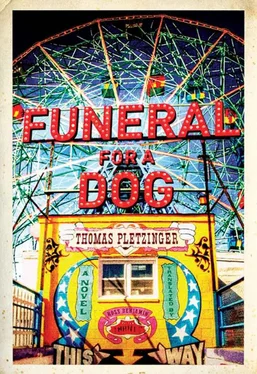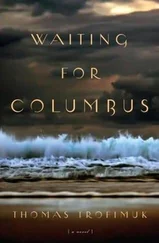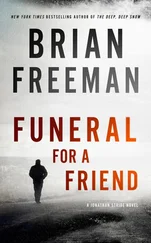Two months later, the day the new volunteer arrives, everything is at first the same as always. A wall encloses the Fundação Ajuda de Nossa Senhora, on top of it glass shards embedded in concrete and razor wire. When David comes back from his last round at sunrise, Felix and I are already awake in our hammocks and mosquito nets. I make coffee with sugar, and Felix smokes some weed before he goes to the bathroom, he sings, er ist achtzig, hat zittrige Finger und ist schon ganz weich in den Knien . David takes off his ski mask and puts the Heckler & Koch in the cabinet, he washes with water from the enamel bowl, he lies down in Felix’s hammock. David guards our sleep, he works when we’re asleep, he makes his rounds along the walls, he sits cross-legged amid the glass in concrete and smokes, sometimes he shoots a cat with ragged ears, sometimes one of the gray street pigs, and leaves them there until the dogs get them. At first everything is the same as always: at six the gate is opened, in the old people’s barracks the residents wake up, at seven the padre says the morning prayer in his purple baseball cap. At seven-thirty comes the soup kitchen cook Cris, at eight the mothers bring the first children, at nine comes the dentist, and I throw the first molars on top of the onion skins and chicken bones. I’ve learned how to give injections. On the train platforms behind the Fundação Ajuda de Nossa Senhora the railroad children sit with their plastic bags and glue cans, they get orange juice and bread. Felix feeds the chickens, he milks the goats, he gives the smallest children the bottles, he rocks them to sleep. Today he is doing all this for the last time, today the new volunteer is supposed to arrive on the six o’clock bus from Recife, we send one of the railroad children to Rodoviária to pick her up.
Today is a special day, today the water is supposed to come. In the morning I crush ants and spiders underfoot, I sweep the bedrooms and the courtyard, I drink the sugary coffee. I’ve grown thin, I’ve already gotten over the vomiting and diarrhea, I’ve spent nights lying awake next to the toilet. Now I wear friendship bracelets around my wrists like all the Europeans in the Fundação Ajuda, for health, for good luck. At eleven Felix and I drive the pickup into the city. For the last time we buy drinking water in containers, three sacks of concrete and two iron bars for the last steps to the water tower. We buy beer and a bottle of champagne. Felix and I work hand in hand, we saw, plane, nail. In the courtyard the hungry stand barefoot in line, there’s feijoada and rice, oi, gringos , they say to Felix and me. At eleven-thirty the bars are bent into makeshift steps, fourteen metal hooks up to the top, the last two we affix around twelve. We check the struts, we test-run the pump without water. Then the water tower is standing, it took us two months, a large metal tank on four legs, cast in concrete and six meters high. It stands in the middle of Rua do Lixo, against the filth in the area, against the poisonings, against the bacteria, against the dying of children. For two months Felix has driven the pickup into the city every day and bought concrete, pipes, wood and wire mesh with European money. The pipeline runs illegally through the field between Rua do Lixo and Seraverde, four hundred meters of plastic pipes twenty centimeters under the dust, buried by the day laborers at dawn and nightfall, the municipal pipelines tapped only unofficially, officer Santos was willing to turn a blind eye to the construction of the water conduit in exchange for a friendly donation, meus amigos . The pump runs on diesel. For a small fee, compadres , Santos said, he and his dog Lula wouldn’t notice any of this. Everyone helped: David can weld, I learned to mix concrete, Felix can hang in the scaffolding and direct the day laborers, his book in his hand, Water Supply Systems for Home Farming by Williams/Steynman, Chapter “Shut up and play”, everything just roughly tripled.
Today is a decisive day, today Seraverde will become blue or red, today there are elections in all of Pernambuco. The blues and the reds have set up blue and red trios elétricos on the city squares, tractor-trailers with stages and speakers, red and blue VW Bugs with megaphones drive through the streets, they announce a red and a blue celebration: free beer and forró tonight, drinks tonight! Vote blue! Vote red! On Rio do Lixo too the election is being decided, there’s Pitú and promises in exchange for votes: vote for us, meus amigos , and there will be two sacks of concrete per head! The district policeman Santos is the reds’ district candidate for Rua do Lixo, PT, the Workers’ Party, on walls, cars and donkey carts there are pictures of him and his mustache. I ask: Why the policeman of all people? and Felix answers, because everyone knows Santos, everyone has already paid him. Around noon Santos strolls once again down the garbage street, the black dog Lula! Named after the next president of our country, he said, Lula da Silva, remember that name! The black dog is wearing a red-and-white neckerchief, the colors of the Partido dos Trabalhadores. If you vote for me, compadre , I’ll put a roof on your hut, compadre , with the good tiles! Blue and red children play war, their fathers drink sugarcane liquor, cachaça . Wanna bet, Svensson? asks Felix, and I wager our souls and twenty dollars on the reds. In the afternoon Felix slaughters two chickens, the steady spinning of the bird in the air and precise chop of the head with the hatchet he learned from David. To celebrate the occasion there’s garlic chicken with coriander and pimento, we put halved garlic cloves in each of the seventy-seven knife cuts. At four the mothers fetch the children and the milk powder rations, at five the heavy iron gates are closed. The padre with the cap says his evening prayer, he opens a bottle of water and passes out glasses. Everyone is sitting at the round table in the courtyard, the padre, David, Ailton, Lucinda, Cris, Felix, Svensson, Ivan. Urinating is good for you, the padre says after his third glass of water. Today is a special day, today the radio is playing “Girl from Mars,” today merengue and forró waft over from the trios elétricos , today in the middle of the praying and the clinking of glasses there’s a soft knock at the steel door of the Fundação Ajuda de Nossa Senhora. David opens it, and in the dust of Rua do Lixo stands a small, blonde woman with a backpack and without shoes. I’m Tuuli, she says, I’m here as a volunteer.
THE GARBAGE STREET IS seething. It’s dark, on the equator night always falls like a curtain. On the left desert, over us the sky, on the green hills in the east the city, where the rich people live, their streetlamps, the lights of their cars. On a pulley hang a bucket of beer bottles and a bowl of cold chicken leftovers. Tuuli passes out the glasses like someone from here. Everyone has left, David is patrolling along the walls, only Felix, Tuuli, and I remain. Speeches about Rua do Lixo are now wafting from the city, Santos promises order and progress, ordem e progresso, for Rua do Lixo, along with a bottle of Pitú for every vote. Merengue steams through the air, the music gets louder, the speeches, the roar. The smoke of a hundred fires hangs over the huts, burning plastic and earth. On the empty field between the garbage dump and the bus station, which the people here call the murderers’ field, wild dogs are yowling, people are singing and cursing. Over the past few months, three men have been shot here and four stabbed. The reds shoot the blues, the blues stab the reds, the poor kill each other. Two weeks ago someone shot at Felix when he was sitting and smoking in a blue T-shirt in the scaffolding, but this someone only hit the metal bucket next to him. The blues are giving out meat and beer, we hear, but the reds have better music. Occasionally rockets shoot into the night sky, red on the left, blue on the right. Champagne for everyone, says Felix, opening a beer. The water tower is standing, there’s room for three people on the wooden top. David is still patrolling along the walls, we can hear him whistling down there. Tuuli is sitting between Felix and me, her legs dangling over the garbage street, she eats garlic chicken and licks her fingers and lips. Felix and I watch her as she rolls cigarettes and drinks, we look at her fingers, her wrists without multicolored bracelets, her hair tied back, we listen to her Finnish German, we watch her drink and laugh and sing, we fall in love voluntarily.
Читать дальше












